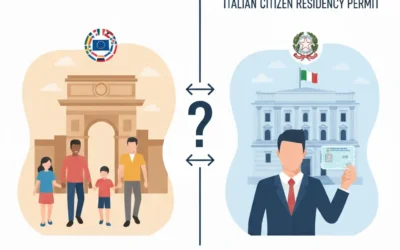The issue commonly known as the “minor case” concerns the loss of Italian citizenship by minors when their parent(s) naturalize in a foreign country during the child’s minority. For over 30 years, the interpretation of Law No. 555/1912 regarding this matter remained consistent, recognizing the retention of Italian citizenship in these cases. However, recent rulings by the Italian Higher Court (Corte Suprema di Cassazione) in 2023 introduced a significant shift, leading to new interpretations and a more restrictive approach.
This article examines the legal framework established by Law No. 555/1912, the longstanding interpretation that prevailed until 2023, and the recent changes that have generated jurisprudential debates and practical challenges for applicants and consular authorities alike.
An Overview Of The Applicable Law
The applicable law is tempus regit actum (Latin: time governs the act), specifically Law No. 555/1912.
Art. 7 of Law No. 555/1912 states:
“Except for special provisions stipulated in international treaties, the Italian citizen born and residing in a foreign State, which considers him a citizen by birth, retains Italian citizenship, but upon reaching adulthood or emancipation, may renounce it.”
Art. 12, paragraph 2 of Law No. 555, dated June 13, 1912, states:
“The unemancipated minor children of someone who loses citizenship become foreigners when they share residence with the parent exercising parental authority or legal guardianship, and acquire the citizenship of a foreign State.”
Historical Interpretation and Practice
For over 30 years, Italian citizenship has always been recognized even when the naturalization of the parent occurred after the child (or descendant) was born. The interpretation given by the Ministry of the Interior has long been:
“The offspring born in the territory of the emigration state to an Italian citizen father acquired both Italian citizenship (through paternal derivation) and the citizenship of the state of birth from birth, thus maintaining dual citizenship even if the parent naturalized as a foreigner during the child’s minority.”
The reasoning behind this has been:
a) Article 7 governs the case of a minor who was both an Italian citizen iure sanguinis (under Italian law) and a foreign citizen (under foreign law) at birth.
b) In contrast, Article 12, paragraph 2, governs the different case of a minor born only Italian who did not already have foreign citizenship at the time of the father’s naturalization, but rather acquired it as a result of the father’s naturalization.
In countries where the principle of jus soli (citizenship by birth on the territory) has long been in effect, such as the United States, South American countries, and Canada, it is evident that an individual born to an Italian parent on foreign soil would automatically hold dual citizenship—Italian by blood (ius sanguinis) and foreign by birth (jus soli). Consequently, according to the prevailing interpretation, Article 12 of Law No. 555/1912 did not apply, and the retention of Italian citizenship was ensured by Article 7.
The Rulings of the Corte di Cassazione
Three decisions by the Court of Cassation (Corte Suprema di Cassazione), our highest court, have taken the stance of not recognizing Italian citizenship in cases where the father naturalized while the child was still a minor: rulings no. 17161/2023, no. 454/2024 and no. 23212/2024.
In brief, the argument strongly supported by the Court of Cassation is that—although Article 7 allows a person born Italian iure sanguinis under Italian law and simultaneously born as a foreigner under the foreign state’s legal system (e.g., by ius soli) to maintain dual citizenship—this same person would lose Italian citizenship if, during their minority, they were not emancipated and their father became naturalized in the foreign country.
This is because the Court stated that Article 12, paragraph 2, applies not only to minors who naturalized together with their father (the dominant interpretation until now) but also to minors who were already foreigners at birth.
The Supreme Court’s second reasons for supporting loss of Italian citizenship by a minor are:
a) During that period, society was patriarchal, and decisions made by the head of the family affected the minors.
b) Italian law aims to prevent statelessness by ensuring individuals are not deprived of Italian citizenship unless they have another nationality. The law considers irrelevant whether the minor already holds foreign citizenship at the time of the father’s naturalization or acquires it simultaneously. The Italian state focuses solely on whether the minor is a foreign citizen to avoid statelessness. The manner and timing in which the minor becomes a foreign citizen according to foreign law are irrelevant and beyond the Italian state’s jurisdiction.
The Ministry of the Interior Circular of October 31, 2024
With the Circular issued on October 31, 2024, the Ministry of the Interior implemented the principles expressed by the Court of Cassation. According to this Circular, in consular procedures, if a parent—whether the father or the mother—naturalized during the child’s minority, the transmission chain of Italian citizenship was considered interrupted, unless it could be proven that the minor who lost Italian citizenship due to the parent’s naturalization reacquired citizenship upon reaching adulthood, pursuant to Articles 3 and 9 of Law No. 555/1912.
This decision has proven difficult to implement, mainly due to a general lack of awareness both of this possibility and of the complex rules regulating Italian citizenship.
This is particularly true in cases where the naturalized parent is the mother. Only in 1983 did the Italian Constitutional Court declare unconstitutional Article 1 of Law No. 555/1912, which previously did not recognize children of Italian citizen mothers as citizens by birth—a principle later confirmed and implemented by the Court of Cassation’s 2009 ruling.
Consequently, in cases of maternal naturalization, the minor was often unaware that they had lost a citizenship right that was never properly transmitted by the mother in the first place.
Decisions from Lower Courts
This new interpretation, often referred to as the “minor case” issue, has caused significant jurisprudential conflicts in first-instance courts. Some tribunals recognize citizenship even when a parent has naturalized, while others deny it, citing the principles established by the Court of Cassation.
Conclusion
The recent shift in interpretation of Article 12 of Law No. 555/1912 marks a turning point in Italian citizenship law. While the historical position long favored the preservation of citizenship for minors born abroad, recent rulings and administrative guidance have created uncertainty and legal fragmentation. As the courts and institutions continue to address these inconsistencies, applicants affected by the so-called “minor case” should seek timely legal assistance to evaluate their eligibility and protect their rights.










